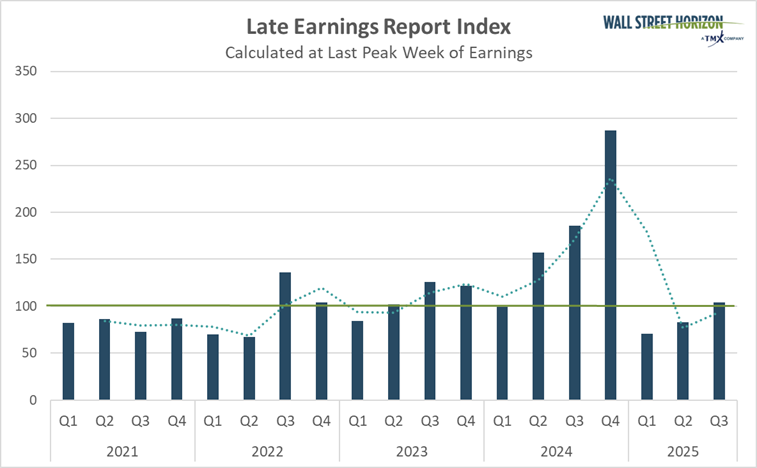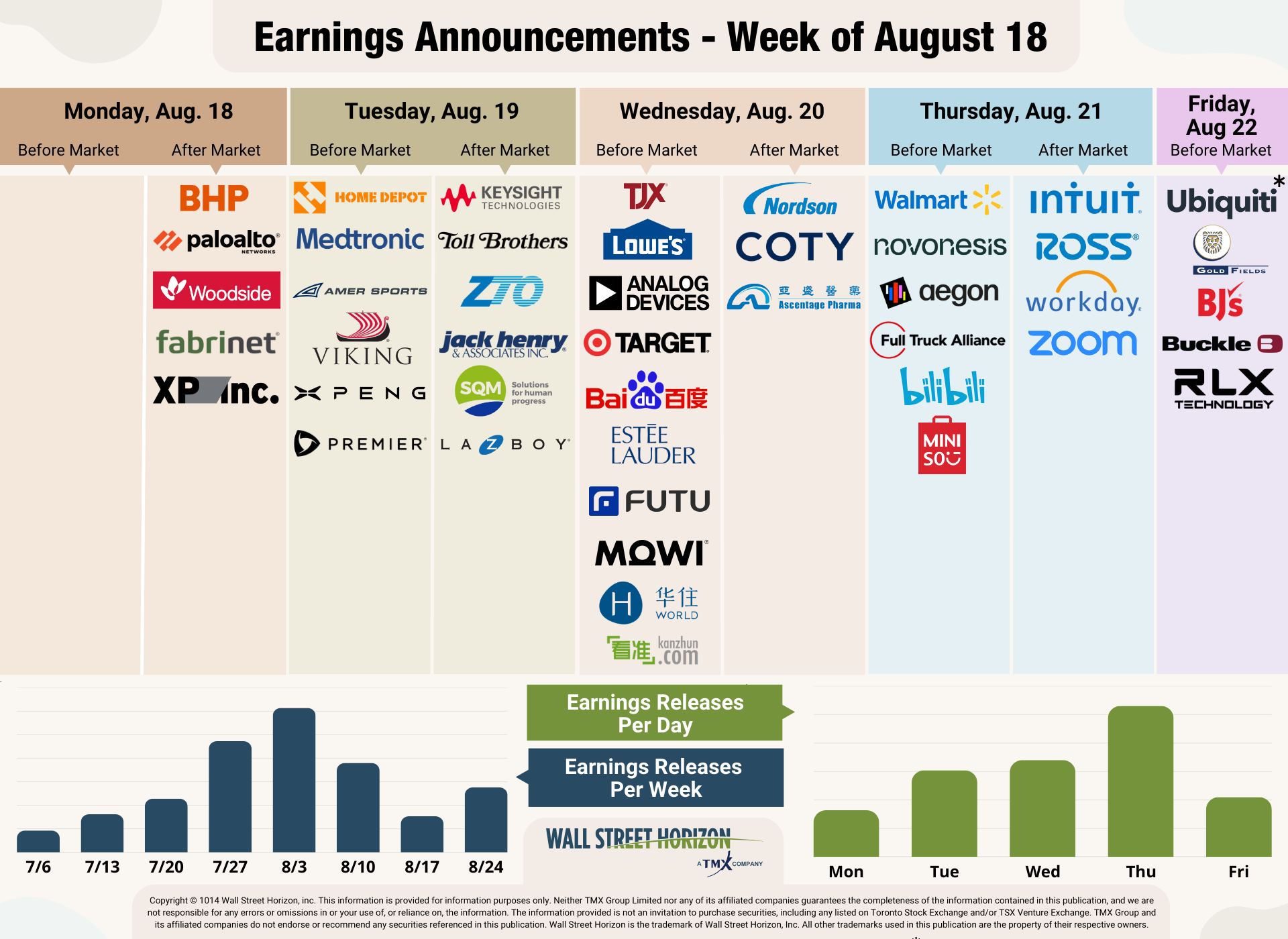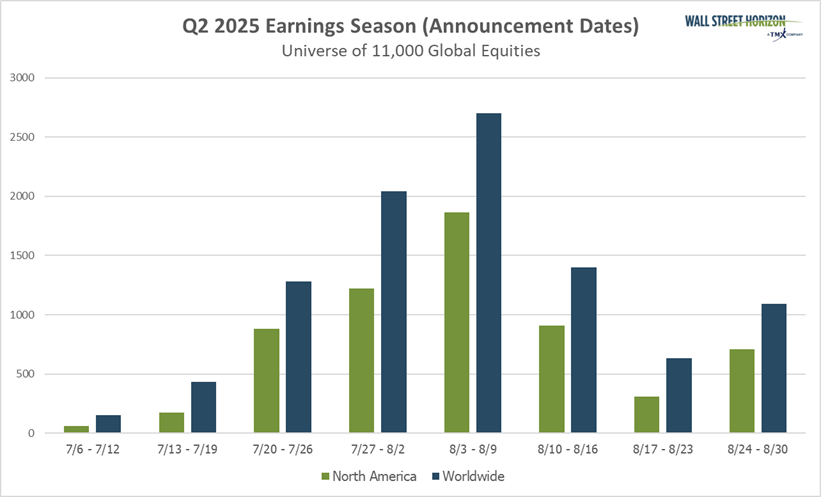Janux stock plunges after hours following mCRPC trial data
-
Retail reports will be in focus this week with names like Walmart, Target (NYSE:TGT), Home Depot, Lowe’s, TJX Companies and more releasing results
-
US Corporations ended the Q2 earnings season less confident than when it started
-
This week 771 companies are scheduled to report Q2 results
Retail Earnings in Focus as Inflation and Weak Jobs Squeeze US Consumer
This week, the focus shifts to US retailers, particularly after recent economic data. Last week’s consumer inflation report, though weaker than anticipated, still indicated a Core CPI increase of 3.1% year-over-year and a 0.3% month-over-month rise – the highest uptick in five months. Analysts interpret this as a sign that tariff costs are being passed on to consumers, a strategy many retailers had previously announced to manage the higher expenses brought by the new trade policies.
The inflation hits kept coming late last week when Thursday’s Producer Price Index showed wholesale prices increased 0.9% in July, well above Dow Jones estimate of 0.2%, and the largest uptick since June 2022.
The preceding week’s jobs report also revealed a softer-than-expected labor market, with July Nonfarm Payrolls coming in at 74,000 and downward revisions for the June and May reports. These indicators beg the question: how is the US consumer really faring? Upcoming earnings reports from retailers should give us some clues.
Steep inflation is not a new challenge for US consumers, who have been contending with rising prices the last five years, initially stemming from supply chain issues brought about by the 2020 COVID-19 pandemic. Government stimulus during that period sustained the economy by supporting consumer spending. Consumers maintained their resilience even as stimulus programs ended and prices remained elevated, largely due to a robust US labor market. However, this year has seen a softening in the job market, with the July Nonfarm Payrolls report raising concerns.
The US consumer’s spending habits are a significant driver of the economy, accounting for nearly 70% of GDP. A key factor influencing this spending is consumer confidence in their job security or their ability to find employment within the next 12 months. If this confidence wavers, consumers are likely to curb their spending. We will be closely monitoring retail reports this week for signs of a pullback, which many retailers noted had already begun earlier this year.
Walmart (NYSE:WMT), with its extensive grocery segment and "one-stop shop" appeal, has benefited from the current cost-conscious environment. While Walmart has stated it would raise prices due to tariffs, it also emphasized efforts to price protect as much as possible, catering to its target audience of value-seeking customers. The company has also observed an increase in higher-income shoppers trading down.4
Currently, we are in the midst of the Back-to-School shopping season, the second-busiest spending period after the winter holidays. The National Retail Federation’s annual survey indicated a slight year-over-year dip in expected family spending, to $858.07 from $874.68 in 2024. However, an increase in purchases of higher-priced items like electronics and apparel is projected to boost total K-12 spending to $39.4 billion, up from $38.8 billion in 2024.5
US CEOs Grow More Uncertain as Earnings Season Unfolds
The Q2 earnings season started with corporate confidence that was relatively high, only to taper off as the reporting season went on. After beginning the Q2 reporting season with a reading that was relatively low at 77 (yet higher than the prior two quarters), the Late Earnings Report Index (LERI), our proprietary measure of CEO uncertainty, has ended the season above our historical benchmark.
The LERI tracks outlier earnings date changes among publicly traded companies with market capitalizations of $250M and higher. The LERI has a baseline reading of 100, and anything above that indicates that companies are feeling uncertain about their current and short-term prospects. A LERI reading under 100 suggests that companies feel they have a pretty good handle on the near-term.
The official post-peak season LERI reading for Q2 earnings season (data collected in Q3) stands at 104, just slightly above the baseline reading of 100, suggesting companies grew less confident as the quarter went on. As of August 13, there were 127 late outliers and 110 early outliers.
Source: Wall Street Horizon
Alibaba Late to Confirm FQ1 2026 Earnings Date
When a company is late to confirm its earnings date, it tends to correlate with a later than usual earnings announcement. Academic research shows that, when a company confirms a quarterly earnings date that is later than when they have historically reported, it’s typically a sign that the company will share negative news on their upcoming call, while moving a release date earlier suggests the opposite.6
Alibaba (NYSE:BABA) has normally confirmed its fiscal Q1 earnings date by August 7, or about two weeks before they report. This earnings season they confirmed just this morning, Monday, August 18, for a Friday, August 29 report date. Both the confirmation and report date are about two weeks later than usual. Also, reporting on the Friday before a holiday weekend in the US (Monday, September 1 is Labor Day) might be giving some clues of its own. Releasing earnings results on the Friday before a long weekend is often seen as a way for companies to potentially minimize a negative reaction to worse-than-expected results as fewer investors will be paying attention. Reporting on a Friday is new for Alibaba, which has released FQ1 earnings on a Thursday for the last nine years.
Why might BABA have delayed in the first place? It’s possible Alibaba may have delayed announcing their next earnings date due to ongoing tariff negotiations with the United States. On Monday, August 11, President Trump once again announced a 90-day tariff truce between the two nations. The U.S. will maintain its 30% tariff on Chinese imports, and China will keep its 10% levy on American goods.7
While nearly 3/4 of Alibaba’s business comes from within China and therefore wouldn’t be subject to such tariffs, the Chinese customers and businesses that use its platforms could feel the pinch from retaliatory tariffs that China would have placed on imports from the US – a whopping 125%.
On Deck This Week
While Q2 peak season is officially over, there are still quite a few big names out this week that investors will want to pay attention to. Many of those reports will come from the retail space, with the likes of Walmart, Home Depot (NYSE:HD), Lowe’s Companies Inc (NYSE:LOW), Target, and more scheduled to release results.
Source: Wall Street Horizon
Q2 Earnings Wave
The Q2 earnings season cools off from here, with only 771 companies expected to report. Thus far, 74% have reported (out of our universe of 11,000+ global names).
Source: Wall Street Horizon
